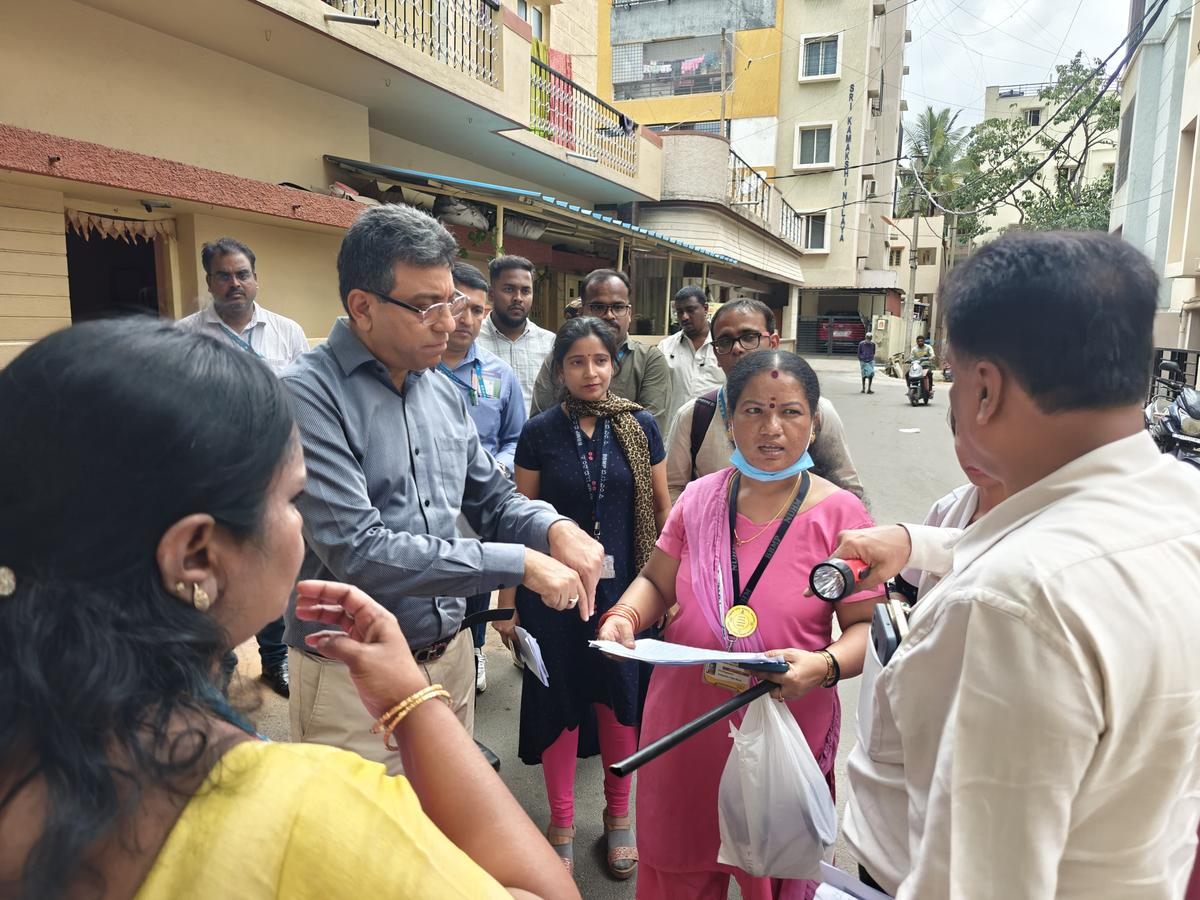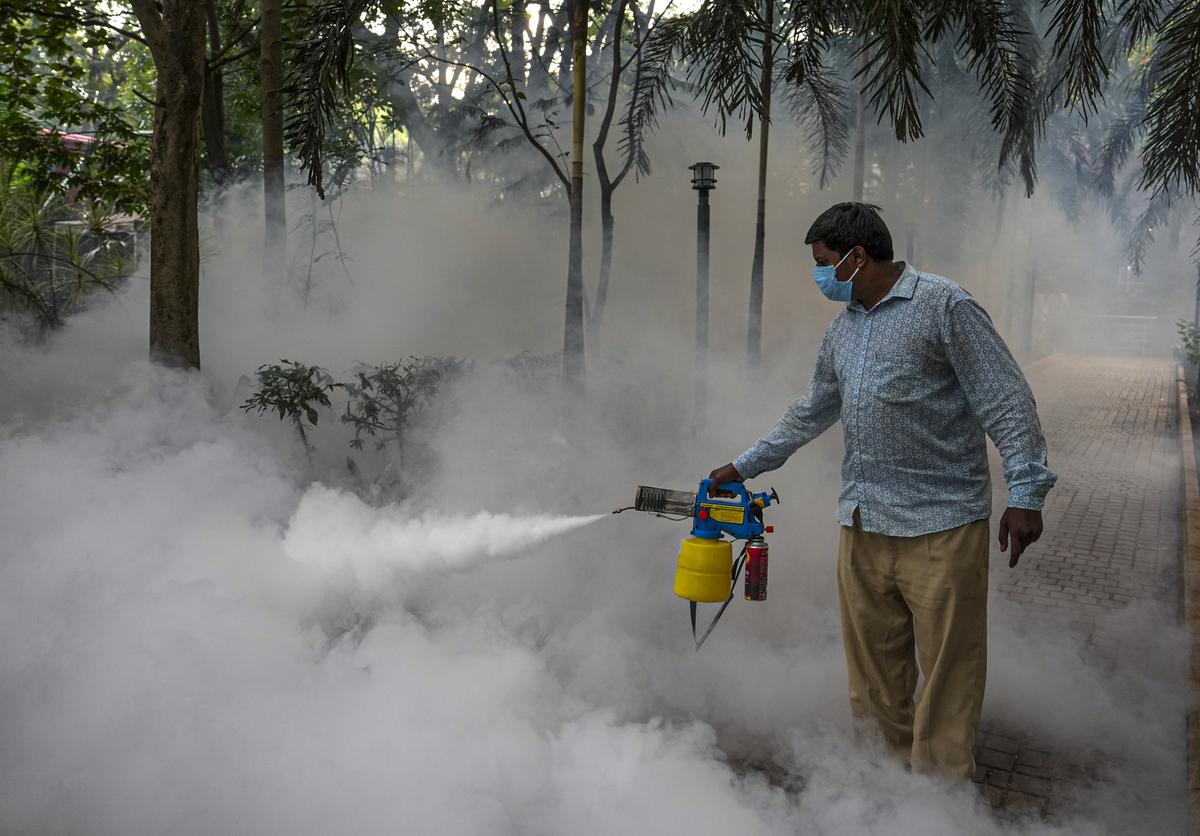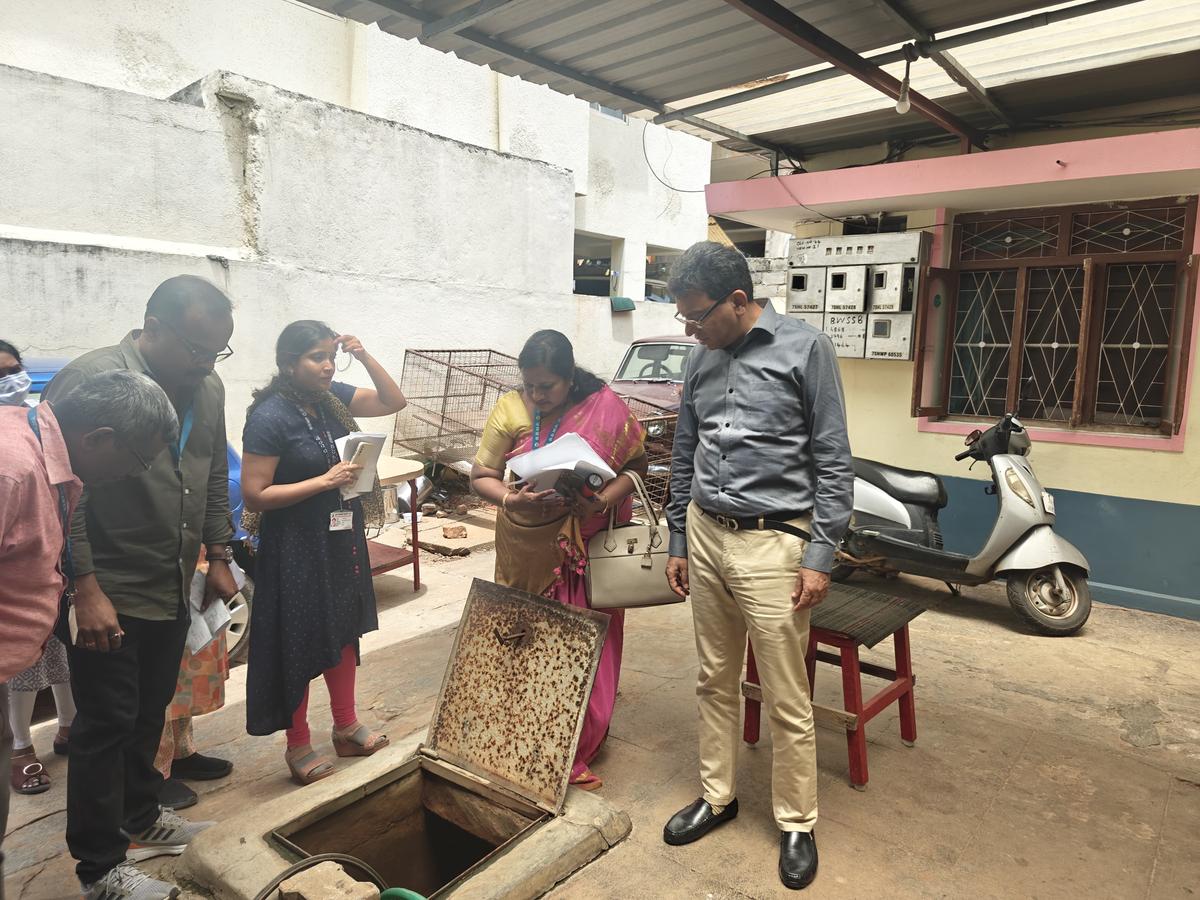[ad_1]
As Bengaluru grapples with a surge in dengue cases, the city’s residents are facing a public health challenge. The monsoon season has aggravated the spread of this vector-borne disease, with stagnant water and moderate humidity creating ideal breeding conditions for the Aedes aegypti mosquito, the primary vector for dengue.
As on July 13, Karnataka recorded 9,000 dengue cases this year, with 2,830 cases in the Bruhat Bengaluru Mahanagara Palike (BBMP) area alone. With the growing cases, it is imperative that apartment complexes and gated communities take proactive measures to protect their residents and curb the spread of dengue.
To educate apartments and gated communities, the Health Department under the BBMP along with the Bengaluru Apartments’ Federation (BAF) is educating residents on how to tackle the situation, by giving out advisories and conducting talks by doctors.

BBMP’s chief commissioner Tushar Girinath and his team inspecting residences across the city.
| Photo Credit:
SPECIAL ARRANGEMENT
Mosquitos breed in vicinity
Speaking to The Hindu, BBMP’s Special Commissioner for Health, Suralkar Vikas Kishor, said that if there is a positive case within an apartment or a gated community, there is an 80% chance that the mosquito has bred in the vicinity. “As far as handling dengue in gated communities and apartments is concerned, we along with the Chief Commissioner have issued guidelines through a video conference to the Bengaluru Apartments’ Federation and other resident welfare associations (RWAs) a few days ago. The guideline helps the association understand how mosquitoes breed, what must be done to prevent the spread of dengue and what must be communicated among their residents.“
He said that residents need to understand that this mosquito can breed even in fresh water including sump and tanks, but the travel distance of this breed is no more than 10 meters. “If your household is kept clean, you use mosquito nets and repellents, cover yourself when outdoors, and try to do regular fogging of the surroundings, half of the job is done,” he added.
Self-care, self-prevention and protection is important, and if there are any symptoms typical of dengue, one must immediately visit a healthcare facility, as it is treated like any other viral infection, Kishor said.
Vikram Rai, president of Bengaluru Apartments’ Federation (BAF), said the they have set up a health programme that is issued to every apartment. “A few days ago, we met officials from the BBMP Health Department, and they shared a few tips on how to tackle the dengue situation. We also held talks with a few doctors from a private hospital with all our members online for guidance. Since most of the cases are from the Whitefield area, the talk with hospital has helped amplify the programme,” he said.
“Apart from the collaboration with the BBMP and the hospitals, we have also introduced the Kshema Health Wellness programme. Under this programme, every week we conduct online talks by doctors, on issues like seasonal diseases in children and preventive measures, seasonal diseases in adults with comorbidities and more such issues. These sessions can be accessed by anyone on the BAF Bangalore channel YouTube,“ Rai adds.

A municipal worker fumigates a park in a bid to kill mosquitos off amidst reports of highest dengue cases in the city, in Bengaluru.
| Photo Credit:
SHAILENDRA BHOJAK
Residents prepare to battle dengue
Residents of apartments and gated communities across the city are finding their own ways to battle dengue. Syed Inayathulla, a member of the RWA of Nandi Shelters Apartments in Turahalli, said the apartment is focused on making sure there is no stagnant water in the entire premises, “Many neighboring apartments that are highly populated started having positive cases for dengue a few weeks ago, and we took action at our apartment immediately. We regularly fog the apartment area to prevent mosquito breeding, but we also understand that stagnant water is the main source for mosquito larvae to breed and the reason for the spread of dengue.“
“We have made sure that our water sumps and overhead tanks are completely covered. Many of the solar water heating panels were leaking, leading to stagnant water on the terrace, so we immediately asked our residents to get them fixed. Most importantly, almost every house in the apartment has flowering pots, and many require stagnant water for the plants to grow, we have requested the residents to remove such pots until the dengue scare is away,” Syed adds.

BBMP’s chief commissioner Tushar Girinath and his team inspecting a resident amidst dengue outbreak in Bengaluru.
| Photo Credit:
SPECIAL ARRANGEMENT
Misting more effective
Meanwhile, Jayanta Sen, a former member of the RWA of Golden Blossom Apartment in Kadugodi, said misting has been more effective in mosquito breeding prevention, “Dengue is something that happens every year, and we have protocols in place to largely monitor the issue of shallow water standing across the campus. We have fogging done three times a week, throughout the year. But during the dengue or chikungunya season, along with fogging, we also opt for misting.”
He explained that misting is like fogging, but more effective. Fogging is helpful to immediately reduce the breeding of mosquitoes in large areas, but misting helps in continuous mosquito control. In misting the technician uses a mist applicator to directly apply the product to targeted locations, the larger droplets are more effective in hitting the targeted areas and kill mosquito eggs before they hatch.
Natural remedies too
Harshitha Rajpurohit, a resident of Candida Apartments in Sanjaynagar, says natural remedies are being used to prevent breeding of mosquitoes.
“We conduct fogging daily or at least on alternate days. However, in recent weeks, we have started spraying organic and herbal insecticides in common areas like parking lots and gardens during the mornings and evenings, as this is when most residents are outside. We are also growing medicinal plants such as neem, Tulasi, lemongrass and other plants in pots at our doorsteps and balconies, to help prevent the breeding of mosquitoes. The strong smell from these plants acts as a repellant.”
BBMP’s dengue advisory to residences
Signs and symptoms
• Aedes mosquitoes breed in water storage containers in both indoor and outdoor situations.
• Elimination of breeding site through ‘source reduction’ plays a crucial role in prevention of dengue fever.
• All water storage containers should be kept covered, to avoid Aedes breeding. Containers should be scrubbed and cleaned once a week, as eggs sticking to the inner walls of the containers can withstand desiccation and remain viable for up to a year.
• Solid waste material scattered around the houses should be disposed to avoid collection of rain water.
• Defrost tray of refrigerators, pot saucers, containers of ornamental plants, fountains, bird bath etc., should be cleaned periodically to avoid Aedes breeding.
• Larvivorous fish like Guppy and Gambusia, that feed predominantly on mosquito larva, can be released into water storage containers.
Personal protection
• As Aedes mosquitoes are mostly day-biters, children should wear full sleeved clothes.
• Elderly and children who rest during the daytime should use mosquito nets in bedrooms to prevent exposure of day biters.
• Doors and windows may be meshed to avoid the entry of mosquitoes.
• Mosquito repellents, vaporizers may also be used.
• Thermal fogging is a recommended routine control measure.
[ad_2]
Source link







